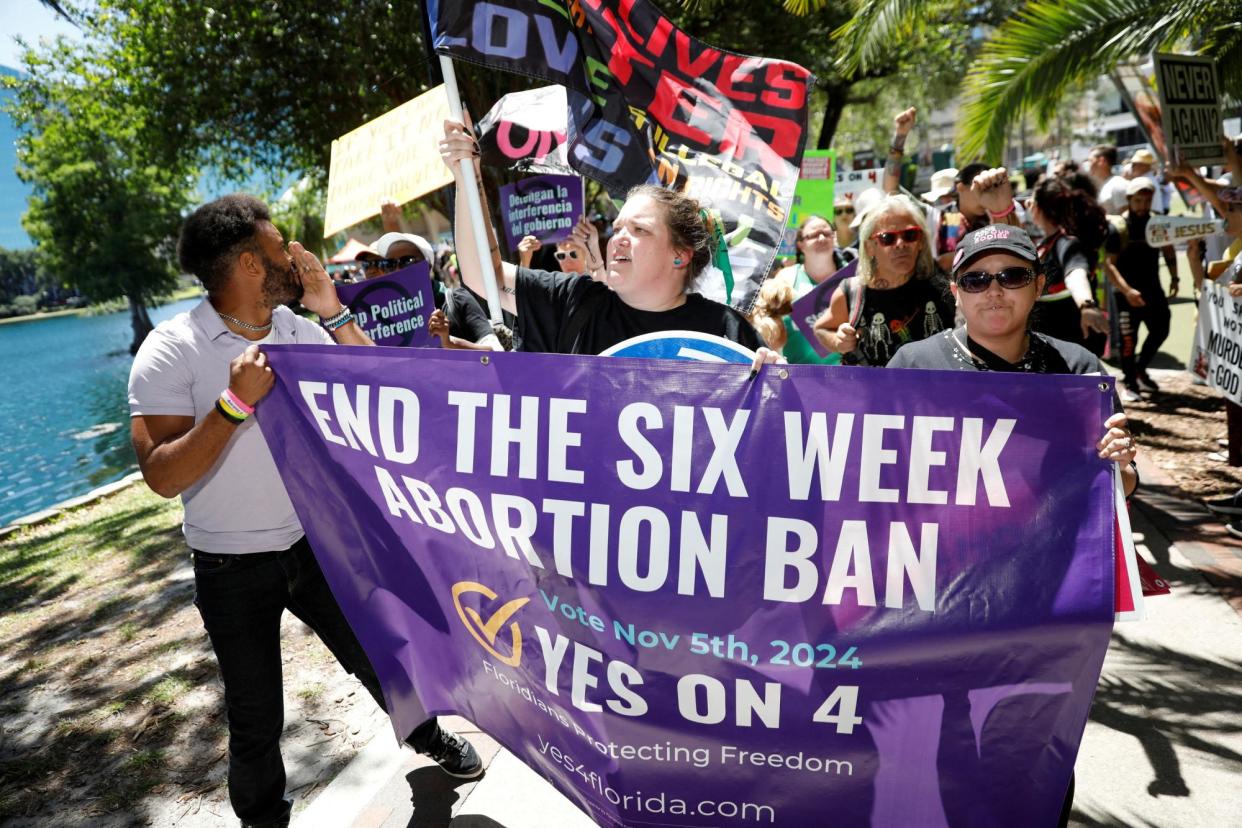Kamala Harris invokes ‘fight for our freedom’ as Florida six-week abortion ban takes effect

A six-week abortion ban went into effect on Wednesday in Florida, cutting off access to the procedure before many people know they are pregnant and leveling the south-eastern United States’ last stronghold for abortion rights.
The ban went into force weeks after Florida’s state supreme court issued a decision clearing the way for it to take effect. Strict bans now blanket all of the American deep south, increasing the strain on the country’s remaining clinics. The closest clinic for most Floridians past six weeks of pregnancy is now several states away in North Carolina, which outlaws abortion after 12 weeks of pregnancy.
In a speech in Jacksonville, Florida, on Wednesday, the vice-president, Kamala Harris, lamented that “as of this morning, 4 million women in this state woke up with fewer reproductive freedoms than they had last night.
“This is a fight for freedom – the fundamental freedom to make decisions about one’s own body and not have their government tell them what they’re supposed to do.”
Harris, who has become the Biden campaign’s foremost messenger on abortion, continued: “Starting this morning, women in Florida became subject to an abortion ban so extreme it applies before many women even know they are pregnant. Which, by the way, tells us the extremists who wrote this ban either don’t know how a woman’s body works or they simply don’t care.”
Related: Florida abortion providers brace for six-week ban: ‘Where are these 80,000 patients gonna go?’
Last year, Florida abortion providers performed more than 84,000 abortions, state data found – including more than 9,000 for out-of-state patients, according to the Guttmacher Institute, which tracks abortion restrictions. Roughly 60 % of Florida abortions occur after six weeks of pregnancy.
On Tuesday, the last day before the ban took effect, an abortion clinic in Gainesville, Florida, was trying to squeeze in as many patients as possible. The clinic had added hours throughout April, but the rush was compounded by the fact that, in addition to the impending ban, Florida requires people to have an in-person consultation at an abortion clinic at least 24 hours before they get the procedure or take abortion pills. A patient could have arrived on Tuesday exactly six weeks into her pregnancy, but have been too late to get an abortion given that the ban came into effect on Wednesday.
On Tuesday, the female team of staffers at the clinic, Bread and Roses Women’s Health Center, had to explain these complex regulations to bewildered callers and patients over and over again, as the phones rang off the hook for hours.
Before the six-week ban, Kristin, director of Bread and Roses, said that the clinic rarely saw people before they hit six weeks of pregnancy.
“Most people don’t know they’re pregnant until at least six weeks,” Kristin said in an interview the week before the ban took effect. (Citing fears over privacy, like many other people at the clinic, Kristin asked to be identified only by her first name.) “We try to get people in as quickly as possible, but sometimes we’re one or three weeks booked out, so it’s rare that someone is in before they’re six weeks.”
Compared with 2020, there were nearly 9,000 more abortions in Florida in 2023. Out-of-state abortion patients accounted for almost 60% of that increase, according to the Guttmacher Institute.
Bread and Roses used to see 20 to 30 patients daily, but in April the clinic started to see closer to 40 patients a day, Kristin said. The clinic tends to see somewhere between three to 10 out-of-state patients every day, she said.
“As the states fell, the more increase that we’ve been seeing from other states,” Kristin said.
Kristin declined to say where patients at her clinic are coming from, other than to say that they span the south-east.
In addition to its decision last month to let the six-week ban take effect, the Florida supreme court – which is dominated by Republican-appointed justices – greenlit a November ballot measure to enshrine abortion rights into the state constitution. If the measure passes, the six-week ban would be deemed unconstitutional and abortion would be legal until viability, roughly 24 weeks into pregnancy. Multiple staffers at Bread and Roses wore pins urging people to “vote yes” on the ballot measure.
Roughly a dozen states may have residents vote directly on abortion rights in November. Abortion rights supporters have already won ballot measures in states across the country, including in Republican bastions like Kansas and Kentucky, but in order to win in Florida, the abortion rights measure will need to garner 60% of the vote.
Regardless of its outcome, the vote is months away. In the meantime, thousands of patients could be affected by the six-week ban.
“This is going to be awful, and it’s going to impact the whole south-east,” said Dr K, a family medicine doctor who performs abortions at Bread and Roses. “I just have no idea what these patients are going to do and where they’re gonna go.”
